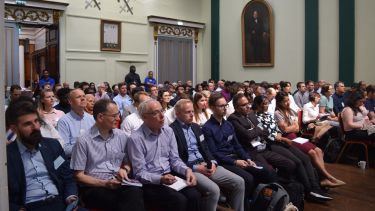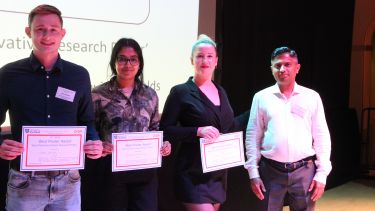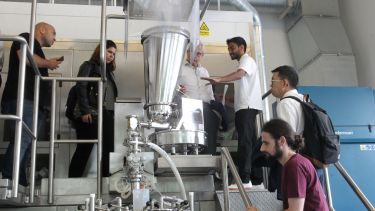∫˘¬´”∞“µ once again found itself at the centre of the granulation world with the return of the International Granulation Workshop - which celebrated its 10th instalment.
Organised by PhD students from the Department of Chemical and Biological Engineering‚Äôs ∫˘¬´”∞“µ Particle Product Group, the weeklong event began with a two day granulation course.
Granulation is the name for the process of forming grains and granules from various powdery or solid substances and materials.
The course saw a record number of attendees gain hands-on, practical experience on a wide array of powder technologies such as tableting, characterisation and both wet and dry granulation.
In-depth lectures giving insight into the science behind these technologies were also provided by experts from academia and industry. The institutions represented during the event include Nestle, GSK, ∫˘¬´”∞“µ, AstraZeneca, Alexanderwerk, University of Leicester, EIRICH, HARKE group, Bene, Meggle, OMYA, Catalent and Verder Scientific.
The three day Granulation Conference was opened by Prof Agba Salman, with the first plenary lecture being given by Prof Jim Litster (∫˘¬´”∞“µ) on "AI in granulation control".
The second plenary lecture was titled "Quo vadis particle technology?" and given by Prof Stefan Palzer (Nestle Research) and Prof Gerhard Niederreiter (Nestle Research).
Plenary lectures given on the second day included Prof Peter Kleinebudde (Heinrich-Heine-University Duesseldorf) on "The future of the pharmaceutical granulation" and Prof Gabriel Meesters (Delft University of Technology) on "Particle coating".
The third and final day saw Prof Gavin Reynolds (Astrazeneca) and Prof Charley Wu (University of Surrey) give lectures on "Starting with the end in mind – systems modelling of pharmaceutical processes" and "Predicting bulk powder behaviours based upon individual particle properties – ADEM approach" respectively.
In addition to these lectures three parallel sessions saw researchers showcase the most cutting edge and novel developments in the field of powder technology. Also featured were representatives from the department's Particle Product Group, who presented on a wide range of topics, including granulation, sustainable packaging and spray drying.
Poster prizes were also given by industry (GSK, AstraZeneca, Glatt and Alexanderwerk) for topics ranging from best pharmaceutically relevant poster to most innovative research.
Attendees were also given a tour of ∫˘¬´”∞“µ‚Äôs continuous powder to tablet manufacturing pilot plant.
Exhibitors from across the powder processing industry also unveiled their latest creations, while the outstanding contributions to the granulation community of Prof Mike Hounslow were recognised during the conference, which returned after a COVID-19 enforced break.





